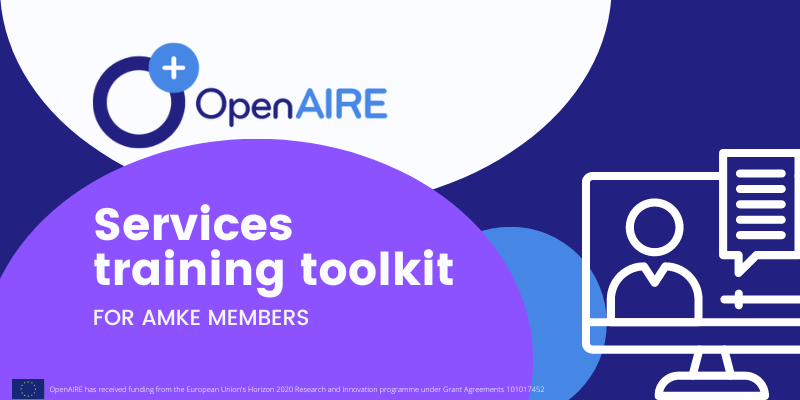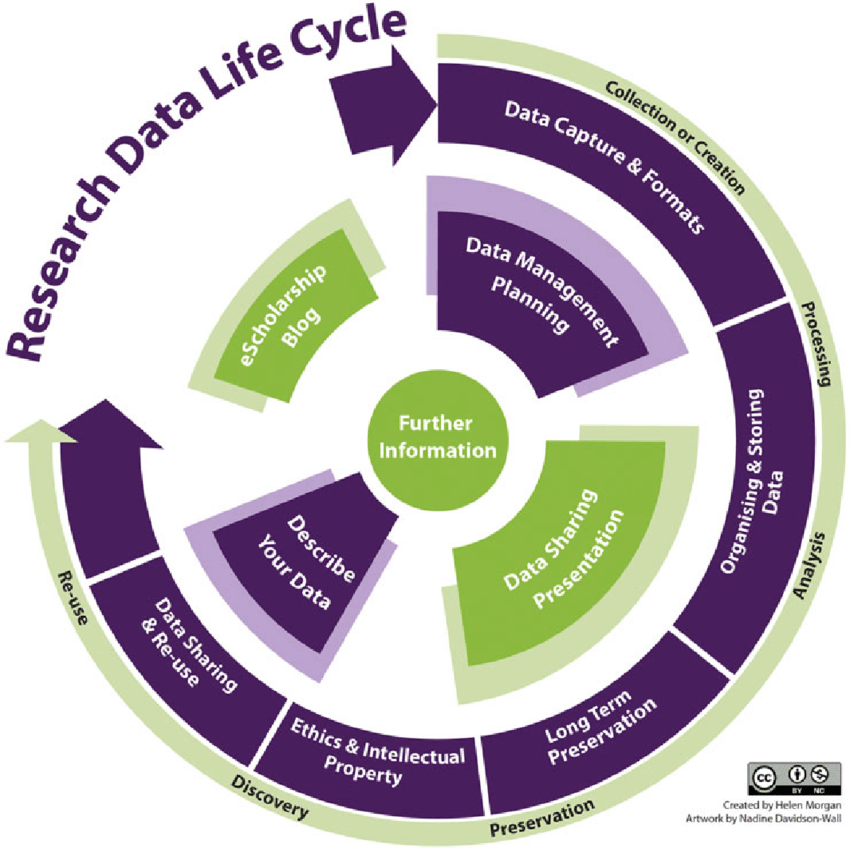
This course is intended to support all OpenAIRE AMKE members to confidently explain the main features and details of OpenAIRE services. This course is organized as a toolkit gathering training and support materials from each service prepared by the training and support OpenAIRE NExus team and the services and product managers.

Research, and how it is conducted, is ever-changing and requires those that are tasked in its support to also keep up-to-date in Research Data Management, Open Access and Open Science in general. OpenAIRE's train-the-trainer bootcamps aim at empowering trainers with the knowledge and the know-hows of Open Science so they can pass it onto the researchers and students themselves, and ultimately help create a more open, transparent and accessible research ecosystem.
Learning objectives
- Develop an in-depth understanding of Open Science, Open Data, Data Management Plans (DMPs), Open Access publishing, Intellectual Property Rights (IPR), Horizon Europe requirements, OpenAIRE services, and the European Open Science Cloud (EOSC);
- Improving the skills to effectively communicate and teach these concepts to researchers, research support, students or any other stakeholders;
- Get familiar with various tools and software that support best practices in Open Science;
- Build confidence and gain the competencies to handle challenging questions, including those related with AI;
- Foster a community of trainers by providing a platform for networking and collaboration.
Organisation
The bootcamp will offer a dynamic and engaging learning experience, combining interactive live sessions in the mornings, networking opportunities and hands-on assignments. You will have the chance to hear from experts in the field and engage in discussions and sharing of your own experiences as a trainer. The networking dimension is a central component of the bootcamp's design, with a variety of activities including breakout sessions and group exercises. Additionally, the use of OpenPlato as a learning platform will facilitate the formation of what we hope to be long-lasting connections among the Open Science trainer community.
Who should attend
Librarians, data stewards, research support staff or any other professional stakeholders who are planning to deliver Open Science training to researchers, research support staff and/or students.
This is an intermediate-level course. You should have, at the very least, some basic knowledge of the state-of-the-art, including awareness around research data management topics and have an intermediate knowledge of Open Access publishing.
Geographically, there are no restrictions and we welcome applicants from beyond Europe! But please note that some of the topics might be more Euro-centric.
Only 20 applicants will be selected for the intensive 5-day course, where participants will be encouraged to interact and collaborate with their peers during and after the course.
Commitments
This course will be free. However, you are expected to commit to the 5 working days of that week. There will be 3 hours of synchronous meetings in the morning (10:00 to 13:00 CEST) and you will have to dedicate time in the afternoons (2-3 hours) to review the materials, complete the individual assignments, participate in optional activities, meet and prepare a presentation with your group and overall interact with other participants for the duration of the course. You will also be asked to familiarise yourself and complete some short activities the week before the bootcamp.
You are also expected to conduct at least one training on an Open Science topic in your institution, country or community within the following year.
Selection criteria
1. Potential and motivation to conduct training on Open Science in your institution, country or community - 50%.
2. Previous experience as a trainer, particularly on topics related to Open Science- 50%.
During registration, you will be asked to answer the following four questions (all compulsory):
- Why would you like to participate in this Open Science trainer bootcamp? (up to 200 words);
- Tell us a little about your experience or skills in Open Science? (up to 200 words);
- Tell us a little about your experience in training or running workshops? (up to 200 words).
- Which training events are you planning on organising within the year following the bootcamp? Tell us about the impact you are expecting to have within your institution, country and/or community (up to 200 words).
Please take your time in answering these questions. The number of participants being limited, we will be deciding who participates based on your answers.
Your answers will be pseudonymised for the reviewing process, so please try and not include any information that could allow us to identify you in these answers.
Additional weighting criteria:
- Geographical balance (to establish a good representation of European regions with positive discrimination of eastern European participants).
- Gender (to ensure a good gender balance in the selection).
- Preference might be given to the OpenAIRE AMKE members.
- Teacher: Marios Balatzaras
- Teacher: Antónia Correia
- Teacher: Judit Éva Fazekas-Paragh
- Teacher: Pascal Flohr
- Teacher: Pedro Principe
- Teacher: Milica Sevkusic

This course introduces the principles and practices of research data management and sharing.
By the end of the course, participants will have developed an understanding of the diversity of research data and the corresponding management needs throughout the data lifecycle. They will be able to identify the essential components of effective data management plans. They will be acquainted with recognised best practices for handling data, including its organisation, documentation, storage, and security.
In addition, participants will appreciate the importance of data archiving and sharing within the context of Open Science, and will gain the ability to critically evaluate the trustworthiness and suitability of data repositories.

The curriculum developed through the collaboration between Research4Life, DOAJ, and ASSAf spans five clusters of four weeks each, structured into four distinct modules:
DOAJ Introduction & Overview: This initial module provides a foundational understanding of the Directory of Open Access Journals, detailing its mission to enhance the visibility and usability of open access scholarly journals. It introduces participants to the criteria for inclusion in the DOAJ and the benefits of being listed, supported by slides and a video presentation.
Submitting a Scholarly Journal Application to DOAJ: The second module guides participants through the process of applying for DOAJ inclusion. It covers the detailed requirements for submission, such as demonstrating a robust peer-review process and providing clear information about journal ownership and policies. This module also includes practical slides and a video to aid understanding.
Best Publishing Practices for Scholarly Journals: This module emphasizes the importance of adhering to best publishing practices to ensure the integrity and credibility of scholarly communications. Participants learn about maintaining high standards in publishing, including ethical guidelines and transparency, critical in the fight against predatory publishing.
Maintaining Research Integrity and Ethics: The final module focuses on the ethical aspects of scholarly publishing. It discusses how to uphold research integrity, the use of AI tools in publishing responsibly, and the importance of human oversight in the publishing process.
Each module is designed to equip editors and publishers, particularly from lower- and middle-income countries, with the knowledge and tools necessary to improve their journals' quality and reach, furthering the global Open Science movement.

This course is intended to support all OpenAIRE AMKE members to confidently explain the main features and details of OpenAIRE services. This course is organized as a toolkit gathering training and support materials from each service prepared by the training and support OpenAIRE NExus team and the services and product managers.
- Trainer: Stefania Amodeo
- Trainer: Alane Brunschweiger
- Trainer: Giulia Malaguarnera
- Trainer: Paula Moura
- Trainer: Androniki Pavlidou
- Trainer: Pedro Principe
- Trainer: Tassos Stavropoulos
- Trainer: André Vieira
- Trainer: Zenia Xenou